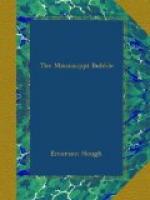Pembroke raised his eyebrows, scarce knowing whether to be amused at this speech or nettled by its cool assurance.
“Some ill fortune?”—he began politely.
“There is no such thing as ill fortune,” quoth John Law. “We fail always of our own fault. Forsooth I must explore Roman roads by night. England hath builded better, and the footpads have the Roman ways. My brother Will—he waiteth below, if ye please, good friends, and is quite as hungry as myself, besides having a pricked finger to boot—and I lost what little we had about us, and we came through with scarce a good shirt between the two.”
A peal of laughter greeted him as he pulled apart the lapels of his coat and showed ruffles torn and disfigured. The speaker smiled gravely.
“To-morrow,” said he, “I must seek me out a goldsmith and a haberdasher, if you will be so good as to name such to me.”
“Sir,” said Sir Arthur Pembroke, “in this plight you must allow me.” He extended a purse which he drew from his pocket. “I beg you, help yourself.”
“Thank you, no,” replied John Law. “I shall ask you only to show me the goldsmith in the morning, him upon whom I hold certain credits. I make no doubt that then I shall be quite fit again. I have never in my life borrowed a coin. Besides, I should feel that I had offended my good angel did I ask it to help me out of mine own folly. If we have but a bit of this cold joint, and a place for my brother Will to sit in comfort as we play, I shall beg to hope, my friends, that I shall be allowed to stake this trifle against a little of the money that I see here; which, I take it, is subject to the fortunes of war.”
He tossed on the board a ring, which carried in its setting a diamond of size and brilliance.
“This fellow hath a cool assurance enough,” muttered Beau Wilson to his neighbor as he leaned toward him at the table.
Pembroke, always good-natured, laughed at the effrontery of the newcomer.
“You say very well; it is there for the fortune of war,” said he. “It is all yours, if you can win it; but I warn you, beware, for I shall have your jewel and your letters of credit too, if ye keep not sharp watch.”
“Yes,” said Castleton, “Pembroke hath warrant for such speech. The man who can make sept et le va thrice in one evening is hard company for his friends.”
John Law leaned back comfortably in his chair.
“I make no doubt,” said he, “that I shall make trente et le va, here at this table, this very evening.”
Smiles and good-natured sneerings met this calm speech.
“Trente et le va—it hath not come out in the history of London play for the past four seasons!” cried Wilson. “I’ll lay you any odds that you’re not within eye-sight of trente et le va these next five evenings, if you favor us with your company.”
“Be easy with me, good friends,” said John. Law, calmly. “I am not yet in condition for individual wagers, as my jewel is my fortune, till to-morrow at least. But if ye choose to make the play at Lands-knecht, I will plunge at the bank to the best of my capital. Then, if I win, I shall be blithe to lay ye what ye like.”




